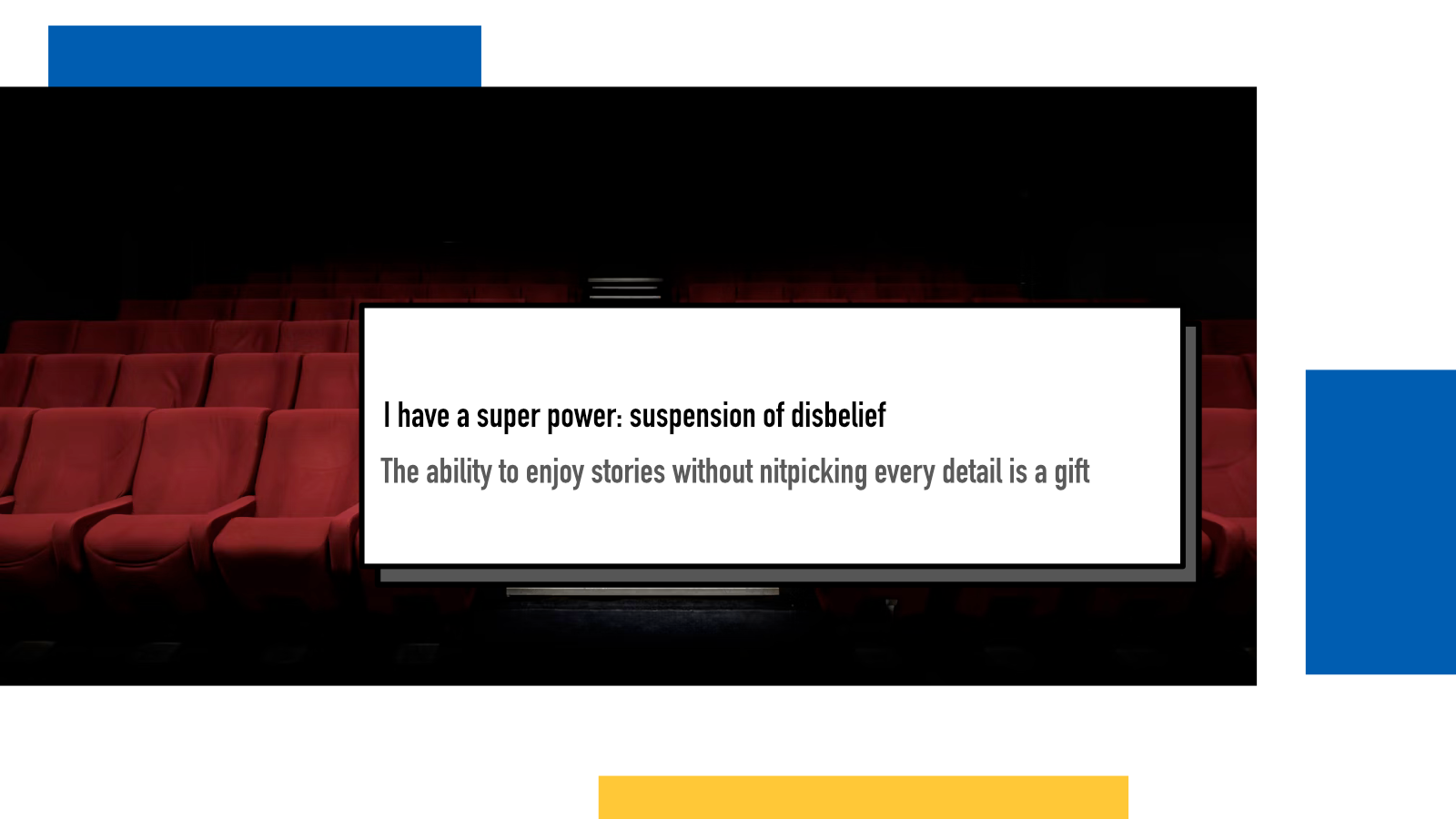I have a super power: suspension of disbelief

A lot of people seem to think that being very critical is a virtue. Questioning things and not believing everything you’re told is a good idea in life but when it comes to entertainment and stories, it makes me sad how some people ruin their own entertainment by being overly critical.
That’s why I consider my ability to willingly suspend disbelief is such a super power.
Suspension of disbelief
Oxford Reference describes the suspension of disbelief as
The concept that to become emotionally involved in a narrative, audiences must react as if the characters are real and the events are happening now, even though they know it is ‘only a story’.
On a high level, it means the ability to enjoy stories despite knowing they are not real. But it’s not a binary thing, it’s a spectrum and I find myself on the far end of it.
In her video essay Suspension of Disbelief in Fantasy and Fiction, Bookborn makes a case for the importance of internal consistency in stories and world-building in fiction. We tend to have easier time believing in large fictions and especially things that we don’t have real-life experience of.
We can rather easily accept that there are dinosaurs roaming around in Jurassic Park movies because we’ve never seen them but a scene where someone runs wearing heels irks as inconsistent to those who have walked in heels before.
Ludonarrative dissonance
A related topic is ludonarrative dissonance, a term coined by game designer Clint Hocking in his essay Ludonarrative Dissonance in Bioshock. In it, Hocking writes about the problems the game has in what it is as a game and what it is as a story:
To cut straight to the heart of it, Bioshock seems to suffer from a powerful dissonance between what it is about as a game, and what it is about as a story. By throwing the narrative and ludic elements of the work into opposition, the game seems to openly mock the player for having believed in the fiction of the game at all. The leveraging of the game’s narrative structure against its ludic structure all but destroys the player’s ability to feel connected to either, forcing the player to either abandon the game in protest (which I almost did) or simply accept that the game cannot be enjoyed as both a game and a story, and to then finish it for the mere sake of finishing it.
Initially it was a tool for critical analysis of game design but it has slightly transformed to be used as a term to explain all sorts of discrepancy between the gameplay and the story being told. One that I’ve heard many times over is how in Uncharted game series the main protagonist Nathan Drake in the story is “a charismatic and good-natured yet rebellious treasure hunter” but throughout the games’ action scenes, he kills hundreds of people and destroys the surroundings in action-packed explosions and chase scenes.
Dan Olson has a great video on the topic if you want to dig a bit deeper.
It’s a super power, really
My ability to willingly suspend my disbelief to the max is a wonderful super power that helps deal with ludonarrative dissonance as well. I’m also really good at not letting out-of-universe reasons ruin my experience when they manifest as inconsistencies in the stories.
Some of those thing can be reasoned with or retroactively explained. Something like the more advanced technologies in Star Wars prequels compared to the original trilogy is quite clearly a case of out-of-universe improvements in what can be done but also something a lot of people feel needs an in-universe explanation or they will be disappointed.
Or maybe something is caused by change of actors for the same role or needing to adjust stories because an actor dropped out from production. I don’t need a in-depth in-universe explanation to something that I can ignore and play pretend with.
In fact, I’m often more satisfied when these thing are not retconned. A good story can become worse if it needs to change because of these reasons.
I have always had a very vivid imagination. As a kid, I could play a video game that would just be blocks moving around and I could fully immerse myself in it as if there was something more there. And I never lost that ability to which I’m very thankful of.
For video games, even the concept of respawning (dying and then restarting from a previous spot) is something that fundamentally is at odds with storytelling. We have to accept one of the following:
First option is that what “really” happens is the combination of uninterrupted success cases in which case the stories these games tell are all about near-perfect performances.
Second option is that we accept the stories as they happen, with multiple timelines, time jumps and respawns from death.
Either way, we need to heavily suspend our disbelief on the main issue. Being picky about details in those stories then becomes a bit unnecessary in my opinion.
If something above resonated with you, let's start a discussion about it! Email me at juhamattisantala at gmail dot com and share your thoughts. This year, I want to have more deeper discussions with people from around the world and I'd love if you'd be part of that.